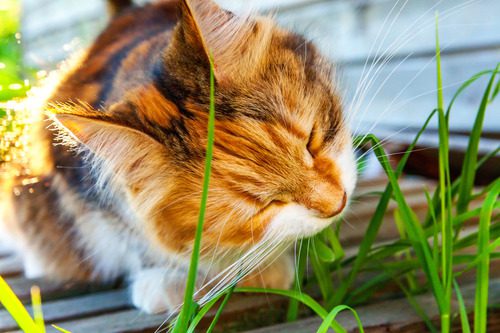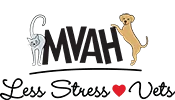Why Do Cats Eat Grass?
Many cat owners have observed their feline friends munching on grass and wondered about this behavior. Cats eat grass for various reasons that are both instinctual and beneficial to their health. This blog explores why cats are drawn to eating grass and highlights when this might be a cause for concern. For more detailed insights and guidance, cat owners are encouraged to contact Merrimac Valley Animal Hospital in Amesbury, Maine, at (978) 388-3074.

Natural Instincts
The Ancestral Diet
Cats, like their wild ancestors, have retained some natural behaviors, and grass eating is one of them. In the wild, cats are known to consume their entire prey, which includes the stomach contents of grass-eating animals. This behavior suggests that consuming grass is a natural part of their diet, providing essential nutrients that they might not otherwise receive in a strictly carnivorous diet.
Digestive Aid
One of the primary reasons cats eat grass is for its role in aiding digestion. Grass contains fiber, which can help with the movement of food through the digestive tract. It’s particularly useful in helping to clear out hairballs from the stomach and intestines, reducing the risk of blockages or digestive distress.
Health Benefits
Natural Laxative
Grass acts as a natural laxative for cats. The fiber in grass helps increase bowel movement regularity, preventing constipation and helping the body eliminate fur and other indigestible substances that accumulate in the stomach.
Vomiting and Cleansing
While it may seem counterintuitive, cats often eat grass to induce vomiting. This is not necessarily a sign of illness; rather, vomiting can be a way for cats to cleanse their digestive systems of what they can’t digest, such as fur from grooming.
Behavioral Aspects
Stress Relief and Pleasure
Eating grass can also be a stress-relieving activity for some cats. The texture and the act of nibbling can be soothing and may also serve as a distraction from boredom or anxiety, especially in indoor cats who have fewer opportunities for outdoor activities.
Curiosity and Play
Cats are naturally curious animals, and young kittens are particularly keen to explore their environment. Eating grass can simply be a part of their play and exploration, testing different textures and tastes as they grow more familiar with the world around them.
When to Be Concerned
Excessive Eating and Symptoms
While eating grass is normal, excessive consumption or a sudden increase in this behavior can indicate underlying health issues. If your cat seems to be eating grass more frequently, and especially if this is accompanied by signs of distress such as continuous vomiting, lethargy, or loss of appetite, it’s advisable to consult a veterinarian.
Safe Grass and Plants
Not all grass or plants are safe for cats. Some houseplants can be toxic if ingested, so it’s crucial to ensure that any plants accessible to your cat are non-toxic. Cat owners can grow a small tray of cat grass indoors, which is safe and can satisfy your cat’s grazing urge.
Understanding Peculiar Cat Behavior
Eating grass is a complex behavior rooted in the natural instincts and physiological needs of cats. While it’s generally not a cause for concern, understanding the reasons behind this behavior can help cat owners ensure their pets remain healthy and happy. If you have concerns about your cat’s grass eating habits or their health in general, call Merrimac Valley Animal Hospital at (978) 388-3074 for expert advice tailored to your unique pet.
Recent Posts
About Us
Merrimac Valley Animal Hospital had humble beginnings in 1968. Dr. Walter Brown opened the animal hospital in a garage next to his home near the current hospital and operated out of this small space until the current building was built in 1969.
